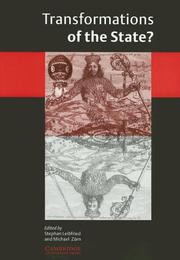| Listing 1 - 10 of 15 | << page >> |
Sort by
|

ISBN: 0521672384 0511752199 Year: 2005 Publisher: Cambridge Cambridge University Press
Abstract | Keywords | Export | Availability | Bookmark
 Loading...
Loading...Choose an application
- Reference Manager
- EndNote
- RefWorks (Direct export to RefWorks)
The influence of the state on human lives is more comprehensive and sustained than that of any other organizational construct. It steers the economy, fights crime, provides education, sustains democracy, enters wars, guarantees social welfare, collects taxes, and deploys some forty percent of the gross national product. Transformations of the State? defines the multi-faceted modern state in four intersecting dimensions: resources, or control of the use of force and revenues; law, or jurisdiction and the courts; legitimacy, or the acceptance of political rule by the populace; and welfare, or the facilitation of economic growth and social equality. The twentieth-century nation-state blended those dimensions and turned the post-WWII era into the golden age of the state. What has become of that state and its functions and what is its future? Political scientists, lawyers, economists and sociologists have examined a sample of OECD nation-states in the search for answers to these questions.
Political systems --- Theory of the state --- Nation-state. --- State, The. --- Social Sciences --- Political Science --- Administration --- Commonwealth, The --- Sovereignty --- Political science --- National state --- State, The --- National interest --- Self-determination, National

ISBN: 0521841356 0521176360 1107140234 0511171234 1281836664 9786611836665 0511082274 0511326688 051149209X 0511196938 0511081820 9780521841351 9780521176361 9780511082276 9780511081828 9780511492099 9781281836663 9786610415854 6610415854 Year: 2011 Publisher: Cambridge Cambridge University Press
Abstract | Keywords | Export | Availability | Bookmark
 Loading...
Loading...Choose an application
- Reference Manager
- EndNote
- RefWorks (Direct export to RefWorks)
This 2005 book argues that Europeanization and globalization have led to ever-more intensive legalization at transnational level. What accounts for compliance beyond the nation-state? The authors tackle this question by comparing compliance with regulations that have been formulated in a very similar way at different levels of governance. They test compliance with rules at the national level, at the regional level (EU), and at a global level (WTO), finding that in fact the EU has higher levels of compliance than both international and national rules. The authors argue that this is because the EU has a higher level of legalization, combined with effective monitoring mechanisms and sanctions. In this respect it seems that the European Union has indeed achieved a high level of legalization and compliance, though the authors add that this achievement does not settle the related queries with the legitimacy of transnational governance and law.
International and municipal law --- Federal government --- Europe --- Economic integration --- Social Sciences --- Political Science --- International and municipal law - European Union countries --- International and municipal law - Germany --- Federal government - Germany --- Europe - Economic integration --- European Union countries --- Economic integration. --- Theory of the state
Book
ISBN: 1316767302 1316766586 1316768023 131675684X 1316770907 1316768740 1107170826 1316621820 1316762262 9781316770900 9781316768747 1316770184 9781316770184 9781107170827 9781316756843 9781316621820 Year: 2017 Publisher: Cambridge
Abstract | Keywords | Export | Availability | Bookmark
 Loading...
Loading...Choose an application
- Reference Manager
- EndNote
- RefWorks (Direct export to RefWorks)
International organizations (IOs) develop institutional provisions to make sure that their policies do not violate human rights. Accordingly, whilst IOs have a greater scope of action and ability to promote collective goods than ever before, they also have a greater capacity to do harm. Based on ten case studies on UN and EU sanctions policy, UN and NATO peacekeeping, and World Bank and IMF lending, this book examines human rights violations which can arise from the actions of IOs rather than those of states. It further explains how powerful IOs have introduced human rights protection provisions and analyzes the features of these provisions, including differences in their design and quality. This book provides evidence of a novel legitimation strategy authoritative IOs draw on that has, as yet, never been systematically studied before.
International agencies. --- Human rights. --- Basic rights --- Civil rights (International law) --- Human rights --- Rights, Human --- Rights of man --- Human security --- Transitional justice --- Truth commissions --- Associations, International --- IGOs (Intergovernmental organizations) --- Institutions, International --- Inter-governmental organizations --- Intergovernmental organizations --- International administration --- International associations --- International governmental organizations --- International institutions --- International organizations --- International unions --- Organizations, International --- Specialized agencies of the United Nations --- International cooperation --- Interorganizational relations --- Non-state actors (International relations) --- International organization --- Law and legislation
Book
ISBN: 9781107170827 Year: 2017 Publisher: Cambridge Cambridge University Press
Abstract | Keywords | Export | Availability | Bookmark
 Loading...
Loading...Choose an application
- Reference Manager
- EndNote
- RefWorks (Direct export to RefWorks)
Book
Abstract | Keywords | Export | Availability | Bookmark
 Loading...
Loading...Choose an application
- Reference Manager
- EndNote
- RefWorks (Direct export to RefWorks)
Book
ISBN: 9780511752193 9780521672382 Year: 2005 Publisher: Cambridge Cambridge University Press
Abstract | Keywords | Export | Availability | Bookmark
 Loading...
Loading...Choose an application
- Reference Manager
- EndNote
- RefWorks (Direct export to RefWorks)
Book
ISBN: 9780198843047 Year: 2019 Publisher: Oxford Oxford University Press
Abstract | Keywords | Export | Availability | Bookmark
 Loading...
Loading...Choose an application
- Reference Manager
- EndNote
- RefWorks (Direct export to RefWorks)
Book
ISBN: 3531910663 Year: 2008 Publisher: Wiesbaden : VS Verlag für Sozialwissenschaften : Imprint: VS Verlag für Sozialwissenschaften,
Abstract | Keywords | Export | Availability | Bookmark
 Loading...
Loading...Choose an application
- Reference Manager
- EndNote
- RefWorks (Direct export to RefWorks)
Der Begriff Governance ist ein Erfolgsbegriff und zwar nicht nur in der Politikwissenschaft, sondern auch in anderen Disziplinen, selbst in der eher begriffskonservativen Rechtswissenschaft. Der Preis dieses Erfolges ist die Uneindeutigkeit des Governancebegriffs, was die Governance-Forschung dazu zwingt, sich über die Begriffsverwendung von Governance zu verständigen und die Verwendungskontexte des Governancebegriffs analytisch sorgfältig auszudifferenzieren. Zu beidem will dieses PVS-Sonderheft einen weiterführenden Beitrag leisten. In den Beiträgen der Herausgeber und im ersten Teil des Bandes geht es um erste Konturen einer Theorie von Governance und die Präzisierung des Governancebegriffs. Der Abgrenzung und Schärfung des Governancebegriffs dienen ferner die Beiträge, die sich mit dem Verhältnis zum historisch so dominanten Organisationsprinzip der Hierarchie auseinandersetzen. Mit dem Teil „Governance und Recht“ wird gezielt ein multidisziplinärer Dialog über das Governance-Konzept eröffnet, und zwar in der Hoffnung, daraus gerade für ein Verständnis von Governance als Koordination von Akteurshandeln in Regelungsstrukturen zu lernen. Die den Governanceebenen gewidmeten Teile – von „National“ zu „Transnational“ Governance – beschäftigen sich mit unterschiedlichen Governance-Kontexten und unterschiedlichen Governance-Modi wie etwa Netzwerken und Public Private Partnerships. Sinn des Bandes ist also weniger eine Bestandsaufnahme der Governance-Forschung, sondern eine Verortung von Governancestrukturen und Governanceprozessen vor dem Hintergrund sich wandelnder Staatlichkeit.

ISBN: 0262026023 9780262026024 0262524619 9780262524612 Year: 2006 Publisher: Cambridge, Mass. MIT Press
Abstract | Keywords | Export | Availability | Bookmark
 Loading...
Loading...Choose an application
- Reference Manager
- EndNote
- RefWorks (Direct export to RefWorks)
Environmental management --- Environmental sciences --- International cooperation. --- Databases. --- Information services. --- Information systems --- Quantitative methods in social research --- International relations. Foreign policy --- Environmental protection. Environmental technology --- #SBIB:327H05 --- #SBIB:327H01 --- #SBIB:327.7H42 --- Internationale betrekkingen: documenten --- Internationale betrekkingen: encyclopedieën, woordenboeken, atlassen --- Specifieke internationale organisaties en samenwerking: milieu --- Environnement --- Gestion --- Coopération internationale --- International regimes database. --- Environmental science --- Science --- International cooperation --- Databases --- Information services --- IRD

ISBN: 1282098314 9786612098314 0262269236 1429409916 9780262269230 0262026023 9780262026024 0262524619 9780262524612 9781429409919 9781282098312 Year: 2006 Publisher: Cambridge, Mass. MIT Press
Abstract | Keywords | Export | Availability | Bookmark
 Loading...
Loading...Choose an application
- Reference Manager
- EndNote
- RefWorks (Direct export to RefWorks)
Regime theory has become an increasingly influential approach to the analysis of international relations, particularly in the areas of international political economy and international environmental politics. The conceptual appeal of the idea of "governance without government"--in which a combination of different organizations and institutions supply governance to address specific problems--reflects a world in which the demand for governance is great but the familiar mechanisms for supplying it are weak. Most research on international regimes employs qualitative methods, often using case studies to develop larger theoretical arguments; but a lack of standardization makes comparative analysis difficult. Analyzing International Environmental Regimes introduces the International Regimes Database (IRD), an important methodological innovation that allows scholars to adopt a quantitative approach to the study of international regimes.The IRD is a relational database that makes it possible to compare records on specific aspects of a number of international environmental regimes that are coded using a single, well-defined set of concepts, definitions, and scales. The book first describes the database and discusses a number of methodological, technical, and architectural issues. It then illustrates the use of the IRD as an analytic tool, drawing on the database for descriptive statistics to evaluate theoretical ideas about compliance, decision rules, and the role of knowledge. A CD containing the full IRD data protocol and all the data currently in the database accompanies the book.
Environmental sciences --- Environmental management --- Information services. --- International cooperation. --- International regimes database. --- Environmental science --- IRD --- Science --- Databases. --- ENVIRONMENT/Environmental Politics & Policy
| Listing 1 - 10 of 15 | << page >> |
Sort by
|

 Search
Search Feedback
Feedback About UniCat
About UniCat  Help
Help News
News